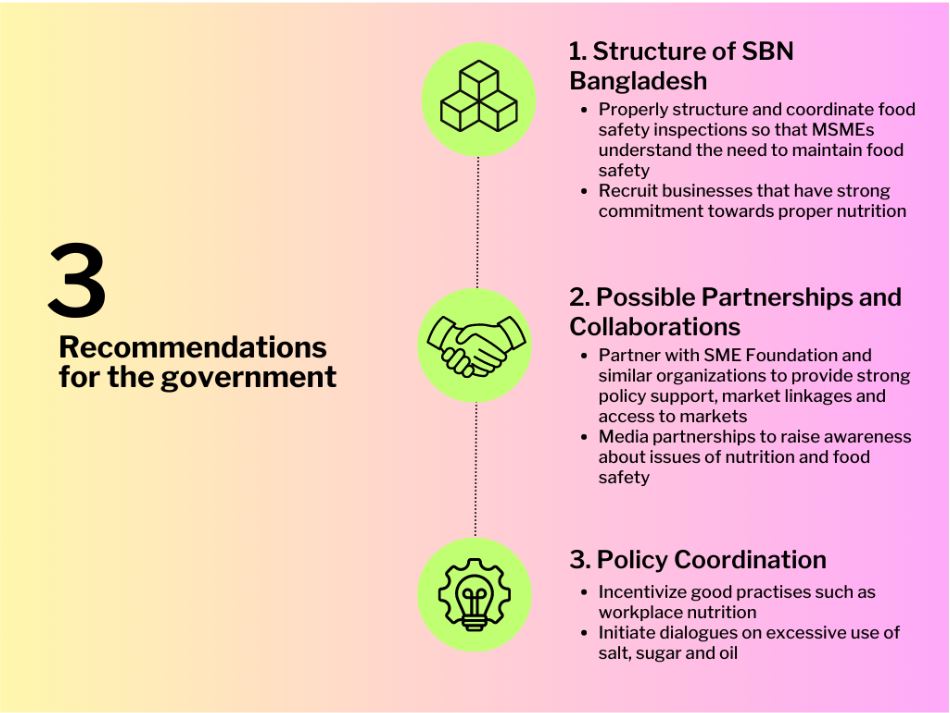This needs assessment has been commissioned by GAIN Bangladesh to understand the technical and financial needs of the Micro and Small Enterprises (MSMEs) to adopt compliant food safety and nutrition practices. The assessment has employed the food safety checklist used by the Bangladesh Food Safety Authority (BFSA) as the standard benchmark for assessing the deviations from the food safety standards. The nutrition element has been assessed based on the nutrient density, retention, and bioavailability of nutrients in the products. The needs assessment has collected data from Narshingdi, Kishoreganj, Chittagong and Jashore. Moreover, the regulators such as the BFSA, BSTI, SMEF, BSCIC has been consulted in developing this needs assessment report.
The needs assessment has focused on value chain of two broad industries, including bakeries and restaurants. The MSME bakeries industry in Bangladesh caters to low-income consumers, particularly hard labour workers such as RMG workers, rickshaw pullers, farmers are major consumer of the bakery products. Our key findings from the assessment are that the bakeries do not maintain proper hygienic condition of the physical infrastructure such as the cleanliness of the floor, mold formations and other areas of cross contamination risks has been observed ubiquitously in the bakeries across the four study locations. There is also significant nutritional risk with high usage of sugar, refined flour, palm oil and hydrogenated edible oil.
The regular consumption of these processed biscuits is likely to cause chronic diseases such as diabetes, hypertension, and cancer as the ingredients of the products contain sugar, salt, and trans-fat content much above the daily dietary requirements. Moreover, most of the bakeries are using sub-standard and toxic food colors, flavours, and other additives, which poses major health risks such as cancer, kidney and liver disfunction. The storage conditions of the raw materials, particularly the hydrogenated fat in the factory floor pose significant contamination risk. Moreover, most of the MSMEs uses semi-automated machineries so the workers use their bare hand to move the products from one part of the assembly to others. The factories also do not have any toilets or hand washing facilities within the factory floor, the workers are constantly sweating, and the drip of the sweat also gets drops into the food.
The restaurants and café across Bangladesh do not maintain food safety norms in terms of the location of the kitchen near to the drain with cross contamination of flies and other insects carrying pathogens to the food. In the kitchens, the assessment has found that there are lack of maintenance and regular cleaning of the floor and cooking materials. There is regular reuse of edible oil and no segregation of meat, fish, and vegetable processing. Moreover, the food safety risk of the restaurant begins with the supply of the wholesale market’s rice, vegetable, fruits, poultry, and dairy. There is no traceability regarding the food safety hazard in the rice, vegetables, dairy, meat, and poultry.
The MSMEs have identified that the lack of consistent standards for ensuring food safety is a hinderance for the factories. The hygiene conditions for food processing industries BDS822:2012 of BSTI is not applicable for the MSMEs. Moreover, the food safety checklist of BFSA is quite generic and does not provide specific guideline for the bakeries to make marginal improvement in their food safety. However, most bakery industry has pointed out that they need to invest in modernizing their bakery by investing in automated machineries to improve the food safety and hygiene standards. However, most of the bakeries do not have the access to finance to implement such expensive capital machineries.
The critical challenge faced by the restaurant is that for most restaurant owners do not own the premises of the kitchen and the food serving area. Improving the food safety concern will require reengineering the kitchen structure. But the premise owner does not allow the restaurant to make changes in the existing structure. Moreover, the restaurant business is a tight margin business; investment in food safety, such as the use of automated cooking, high-quality ingredients and regular cleaning of the kitchen, adds significant costs to the working capital. The consumers are also not aware of the food safety risks.
Scaling Up Nutrition (SUN) Business Network (SBN) a network co-convened by GAIN and WFP Bangladesh needs to design interventions and mobilize resources to systematically address the challenges that have been identified in this needs assessment. The structure of the interventions has designed considering the technical capacity of GAIN and WFP, but it not necessary that GAIN and WFP will implement whole intervention. Some parts of intervention such as the interventions with the farmers, can be implemented by different partner organizations.
The intervention design takes into consideration of a food systems perspective, that is all the actors that are engaged in bringing the food from the farm/soil/water to the consumers plate has been considered in designing the intervention. The different entry point for improving nutrition and food safety has been identified.
There are few structural interventions such as the institutional capacity building on food safety, where more direct intervention is required by building the capacity of the local food technologist and developing a business model so that they can support MSMEs to comply with the BFSA food safety checklist. They will also support the bakeries and restaurants to comply with the regulation of the other food authorities and provide educated and evidence-based compliance mechanism so that there are strong grounds to avoid unnecessary punitive actions and fines from the food regulators.
Finally, the needs assessment provides institutional recommendation to SBN Bangladesh regarding its structure, management, partnership development and mechanism of stakeholder engagement. A theory of change has been developed targeted towards improving the nutrition outcome of food system through the MSMEs.


